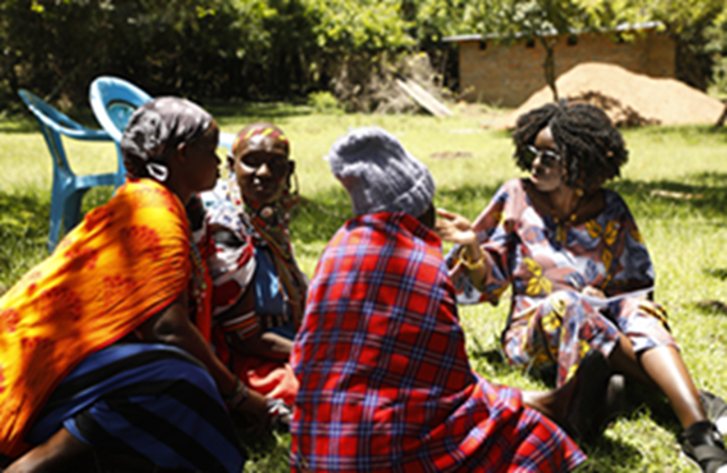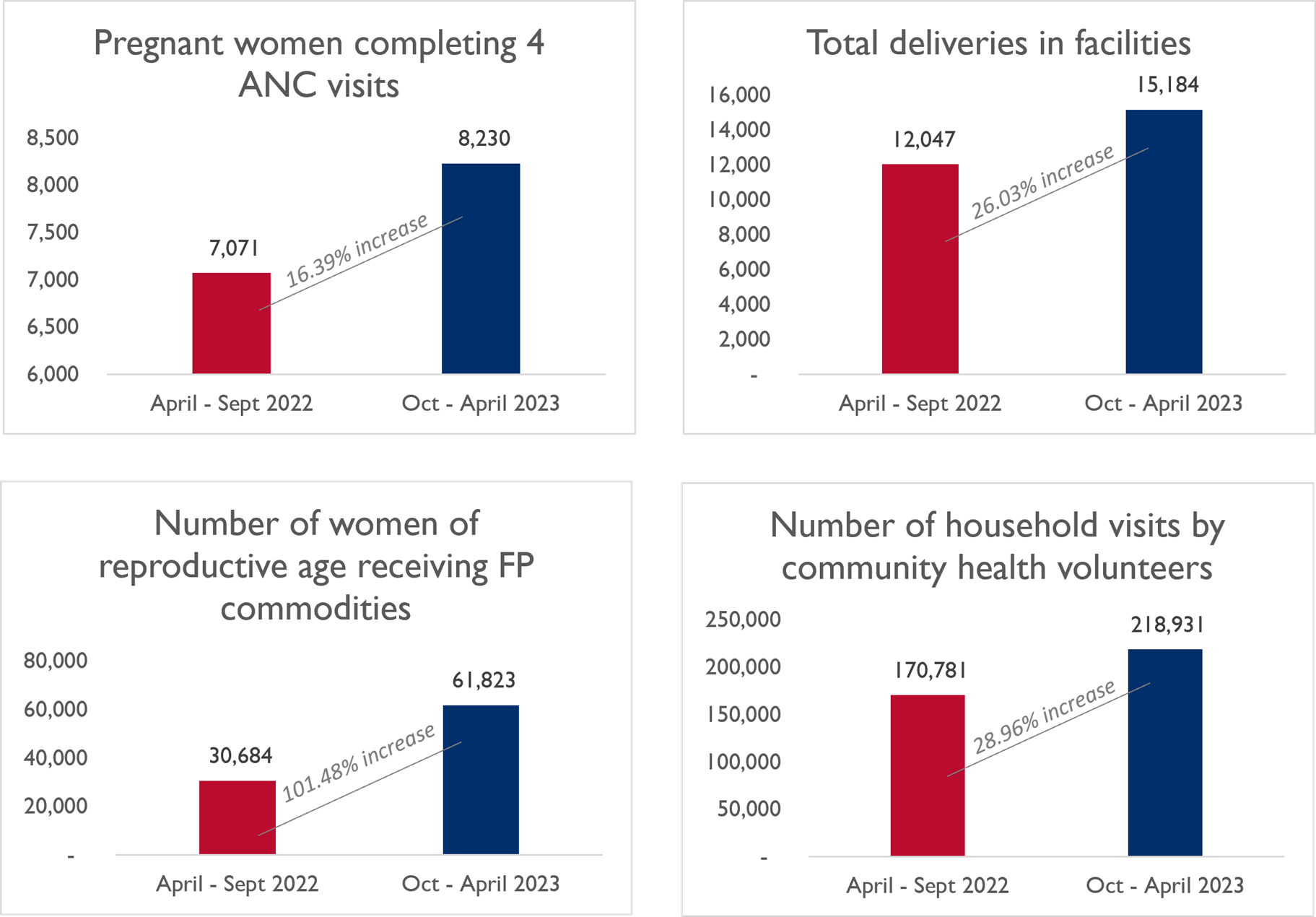Success Story
Co-creation is the Key: Locally Led Program Design in NPI EXPAND Kenya
August 31, 2023
Introduction
Over the years USAID has made numerous efforts to reduce its reliance on international organizations to implement its development programs and put more resources and decision-making power in the hands of local entities—either local non-governmental organizations or local government entities. The most recent efforts have been manifested in the issuance of USAID’s Local Capacity Strengthening Policy and a global commitment to spend at least 25% of development funding through local entities by the end of FY2025.
While these initiatives are laudable, they do not provide practical guidance on how to overcome the critical challenges that have prevented past efforts to localize development These include:
- Limited organizational capacity of local organizations to respond to competitive procurements, manage USAID funds in compliance with US regulations, and to manage large programs;
- The challenge of how to efficiently and meaningfully include local community groups and local government in project design activities and integrate their input in transparent procurement processes, resulting in solicitations that reflect their input and align with USAID funding priorities.
- How to give local organizations the lead role in implementation while ensuring effective coordination between local entities and ensuring they adhere to USAID standards for project management.
Addressing these challenges has been at the core of the NPI EXPAND program which Palladium has been implementing since 2019. The NPI EXPAND program in Kenya provides a number of excellent examples of ways to overcome these challenges and achieve measurable impact.
Background
NPI EXPAND Kenya was invited by USAID Kenya to work in Narok County through local partners to implement community-led interventions that address the family planning, maternal health, and menstrual hygiene issues and integrate gender and environmental conservation approaches. Narok County was selected because it has one of the highest fertility rates (6 children vs. 3.6 national fertility rate) and the highest teenage pregnancy rate (40.4% in Narok vs. 18% nationally) in the country. There are many other cultural and behavioral factors behind these statistics including lack of access to menstrual hygiene products that leads to girls missing eight weeks of learning time each year and a higher dropout rate, lack of access to FP/RH services, and lack of meaningful participation of women in employment and environment conservation activities resulting in economic disempowerment and vulnerability of women. High prevalence of female genital mutilation (FGM) has been documented as a key contributor to early marriages and teenage pregnancies1.
A typical approach for a prime implementer like Palladium would be to immediately issue a Request for Applications (RFA) consistent with the scope received from USAID Kenya before any engagement with the intended recipients of the grant/funding. This approach, however, does not allow for a locally-led design process to inform programming. Instead NPI EXPAND Kenya started with an Expression of Interest (EOI) request with minimal requirements for organizations to respond to when submitting their EOI, to encourage more organizations to apply. The main objective of this step was to identify potential local implementing partners who could participate in a co-design process.
After reviewing submissions, NPI EXPAND selected five local organizations that had the potential to implement FP/MH activities based on their previous implementation experience. These organizations then participated in the co-design process that began with a listening tour of Narok county to hear from members of the community who described barriers to accessing and utilizing high-quality health care. The table below summarizes the topics discussed:
| Top health concerns |
|
| Issues related to culture |
|
| Issues related to gender |
|
| Issues related to conservation |
|
In addition to these various challenges related to health, gender, culture, and systems structures, community members provided their input on their key priority areas for improvement in conservation. The community described a lack of training for youth, who were motivated to participate in conservancy management but didn’t have the proper tools and information to get involved. It was also noted that gendered barriers impacted conservation efforts: women said that they were not able to fully participate and benefit from conservation, and that few female rangers were employed in conservancies.
The key bottlenecks identified during this listening tour formed the basis for the decisions on the approach to implementation and the design of priority interventions to ensure alignment with community-level priorities.

NPI EXPAND Kenya’s Gender Advisor during a community listening session with women in the Mara conservancy.
Co-Creation
The listening tour was followed by a co-creation workshop during which the five organizations shortlisted through the EOI were invited to delve deeper into the FP/MH challenges identified in the listening tour and identify appropriate interventions in collaboration with Narok county health officials and USAID representatives. NPI EXPAND facilitated the discussion with a view to creating a common understanding of the root causes of the problems and the interventions that could mitigate the problems. During the workshop, content on integrating FP/MH into environmental conservation activities and platforms was added. The Maasai Mara Wildlife Conservation Association (MMWCA), a local membership organization of the Mara conservancies, gave a presentation to help the participants understand how the three areas intersect and shared some example activities.
This joint analysis and brainstorming helped NPI EXPAND in preparing a Request for Application and helped the local organizations to think through how they would respond to the RFA.
Program Design
After the co-creation workshop, NPI EXPAND issued the RFA to the organizations that had been prequalified through the EOI stage. Even though the local organizations had participated in the co-creation workshop and understood the technical issues, NPI EXPAND Kenya held applicant meetings to review the RFA and what was expected in the technical application. It was recognized that the prospective grantees wanted and needed additional support in understanding how to integrate FP/MH with environmental conservation and also integrating gender into all three areas. During the applicant’s conference USAID Kenya and East Africa took advantage of this opportunity to provide more information to the prospective subgrantees on the Population, Health, and Environment (PHE) approach to implementation as well as gender integration.
Even with this preparation, NPI EXPAND staff had multiple rounds of reviews to strengthen their responses to the application as well as the budgeting and work-planning processes and guided them to ensure that the planned activities were aligned with county plans. Once NPI EXPAND felt the applications were complete, the County Health Management Team (CHMT) was invited to provide input to the applicants’ proposed activities. This was a new approach for the NGOs who previously finalized their plans and then presented them to the county for buy-in. However, there were times when there was misalignment in priorities, making implementation challenging. This process helped ensure transparency, managing CHMT’s expectation of the available support and increased the county government’s sense of ownership of the activities.
After receiving the local government’s input on the applications, NPI EXPAND issued grants to four local organizations using Fixed Amount Awards: Anglican Development Services – South Rift (ADS SR), Community Health Partners (CHP), HealthRight Kenya (HRK), and National Organization for Peer Educators (NOPE).
This type of award focuses the local organization on very specific deliverables which must be achieved to receive the level of funding agreed upon. Moreover, NPI EXPAND front loads payments for the early milestones so the local organizations have operating capital to avoid cashflow problems which are common for small organizations.
To ensure that the activities were targeted and responsive to the unique needs of the facilities, the sub-counties, and the communities, the project supported the grantees to conduct a Service Availability Readiness Assessment (SARA) for FP/MH. The results of the assessment revealed additional intervention/support areas. For example, the partners had planned to conduct mentorship on Emergency Obstetric and Neonatal Care (EmoNC) and Post-Partum Family Planning (PPFP) but through the assessment it was revealed that the county did not have mentors that could support the mentorship activity. Instead, NPI EXPAND Kenya supported the training of mentors on EmoNC and PPFP in collaboration with the national government. The project also set up program management structures that would ensure that there is accountability at all levels: the county, NPI EXPAND as the prime, and other grantees through a governance structure and clear terms of reference. As the prime, NPI EXPAND played no direct role in implementing activities—the main function of NPI EXPAND was to provide capacity strengthening, quality control, and ensure good coordination and communication between organizations and stakeholders.
The main objective of this intensive approach was to ensure that the project design is responsive to community needs and includes effective strategies that can address complex local problems. Involving the prospective implementers had the additional benefit of strengthening capacity of the local organizations on how to conduct start-up activities and engage with the county to ensure successful and impactful implementation.
Results
The start of any project activity is critical to the quality of implementation and eventually its success. NPI EXPAND Kenya led a co-creation process that built confidence, provided clarity on roles and responsibilities, and created a shared vision for the expected results within the organization and among stakeholders and communities. Stakeholders can now articulate their contribution to expected results and they understand their role in the broader program design. As a result of the strong start-up, the grantees are already achieving great results in reaching the community with interventions that are contributing to improvements in FP/MH indicators, such as increased ANC visits, facility-based deliveries, distribution of commodities, and household visits by community health volunteers (see figures below).

Lessons Learned
Although NPI EXPAND and the local organizations had a general understanding of the health issues in the county, the in-depth process of community consultation and co-creation was critical to identifying effective strategies and engaging key stakeholders. Equally important was setting up management structures for reviewing progress and practicing adaptive management during implementation.
The integration of health, gender, and environmental conservation is an innovative approach to addressing the deeply rooted socio-cultural norms that in the past has hindered uptake of FP/MH services and resulted in increasing teenage pregnancies and poor retention of girls in school. The co-creation process was instrumental in selecting the specific interventions that would address the above issues.
The intensive preparation of the grantees and coaching by NPI EXPAND was also a factor in ensuring stronger design, properly costed activities and smooth administration of grants. Donors and prime partners working with local organizations need to work towards preparing local organizations for success by ensuring the start-up processes are well guided and supported.
Working with local Narok county leadership (CHMT) at the conception and initiation stage of project implementation was also instrumental in ensuring buy-in and support for implementation for the partners, contributing to successes that has been observed in the short period of implementation. As the County Director of Health noted during the co-creation meeting:
“This is the first time Narok County CHMT has been invited to participate in the inception process of a project. This is the way to go for all development partners to ensure support and alignment of activities since we all have a common objective of bringing improvement to the health of the community.”
This strong sense of ownership by the County government bodes well for sustaining the activities and leveraging local resources beyond the period of NPI EXPAND’s involvement.
Reference 1: Olenja J, Krugu JK, Kwaak v.d. A, Kawai D, Karanja S, Apanja M, et al., (2019). Factors influencing teenage pregnancy among Maasai girls in Kajiado West Sub-County, Kenya. An operational qualitative study report as part of the YES, I DO programme implemented from 2016 to 2020.